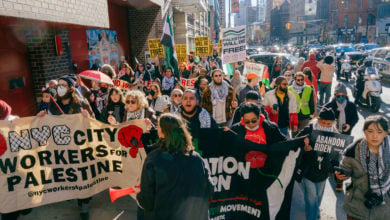This article first appeared in the April 2005 issue of Socialism and Liberation magazine.
Question: When is a nuclear bomb not a weapon of mass destruction?
Answer: When it is produced by the United States.

North Koreans participate in the mass games. |
At least that’s what the U.S. government and big business media would have you think.
With the largest arsenal of offensive weapons in the world, the U.S. government is now turning its sights on Iran and North Korea.
In his 2005 State of the Union speech, Bush called for Iran to stop its nuclear programs. He labeled the country “the world’s primary state sponsor of terror.” He also demanded that North Korea “abandon its nuclear ambitions.” These are well-known code words that mean only one thing for the White House: “You are on the hit list.”
With the International Atomic Energy Agency as cover, the U.S. government is accusing Iran and North Korea of non-compliance with the 1968 Treaty of Non-Proliferation of Nuclear Weapons.
Iran denounced Bush’s accusations, saying that it is developing nuclear power for the country’s energy needs, not weapons. The following week, on Feb. 10, the Democratic People’s Republic of Korea announced it would cancel its participation in the six-party talks directed at Korea’s nuclear power program. The six-party talks include the DPRK, the United States, China, South Korea, Japan and Russia.
Some sectors of the U.S. left are raising the pacifist slogan for “worldwide nuclear disarmament.” Socialists reject that slogan because it ignores the reality that some countries are threatened by imperialism, which is armed with nuclear weapons. Of course, everyone except the militarists is for the abolition of nuclear weapons. However, the real question is whether the oppressed countries have the right to arm themselves against nuclear-armed powers that are threatening to make war against them.
The IAEA is an instrument of the UN Security Council. It applies its enforcement powers selectively against countries of the formerly colonized and semi-colonized world. At the same time, it allows the unprecedented production of nuclear weaponry by the United States.
Both the Non-Proliferation Treaty and the agency’s own statutes give the IAEA unparalleled power to demand entry into and inspection of any country accused of possible violations of nuclear production.
The Non-Proliferation Treaty supposedly freezes the number of countries declared as “nuclear weapon states” at five: United States, United Kingdom, China, Russia and France. But other states like Pakistan, Israel and India have acquired nuclear weapons.
The IAEA closely dovetails its inspections with the foreign policy agenda of the White House. The system works like this: The IAEA makes impossible demands on the targeted country. The targeted government predictably resists, thus providing a pretext for new economic and military threats from the UN Security Council and the United States.
In March 2003, IAEA director Mohamed ElBaradei momentarily hesitated from endorsing the U.S. assertions of Iraq’s nuclear weapons development, just before the U.S. war. Now, as retaliation for his meek resistance, U.S. representatives in the United Nations are trying to unseat him in the next IAEA elections.
Added to the subterfuge of nuclear threat is the issue of “weapons of mass destruction,” pressed by Bush’s new Proliferation Security Initiative. Unveiled by Bush in Poland in May 2003, the PSI is a sweeping policy that arrogates to Washington the unilateral right to initiate the dismantling of all WMD against any country it chooses.
It is an ominous strategy, the equivalent of the Patriot Act applied on an international scale. The United States maintains it has the support of 60 countries for its implementation.
On Oct. 27, 2004, John Bolton spoke in Tokyo about the PSI’s success. He bragged that the United States pressured Libya to cut off trade of goods and services with the DPRK. “All countries participating in PSI are sending a message to rogue states like North Korea.”
Arch-reactionary Bolton, former U.S. Under-Secretary for Arms Control and International Security, is notorious for his false charge in May 2002 that Cuba was engaged in “biological terrorism.” In March, Bush nominated him to be the U.S. ambassador to the United Nations.
Disarm Iraq, bomb mercilessly
The latest crisis facing Iran and the DPRK is reminiscent of the 12-year campaign of intensive weapons inspections used by Washington to economically destroy Iraq through sanctions, in its preparation for a full-scale war and occupation by the United States.
Allegations of Iraq’s weapons program were the propaganda hook used by U.S. government officials in the lead up to the invasion of Iraq. This argument was a highly effective tool for mobilizing public opinion inside the United States in support of the invasion.
U.S. and British leaders feigned fear of WMDs in Iraq. When challenged by those who said that there was no “smoking gun,” Condoleezza Rice, then National Security Advisor, went before the cameras asserting: “We don’t want the smoking gun to be a mushroom cloud.”
Rice, Bush, Rumsfeld, Powell and the rest all knew Iraq had no nuclear weapons, but it didn’t deter them from spouting their war propaganda.
It is important to review exactly what the WMDs issue was really about.
The U.S. war on Iraq was conducted in three basic phases from 1990 to today.
UN Security Council sanctions were imposed on August 1990, following Iraq’s occupation of Kuwait after a long dispute between the two states. The sanctions’ aim was to weaken the Iraqi population in preparation for the 1991 U.S.-led war.
When the U.S.-imposed Jan. 15, 1991 deadline passed, the Pentagon unleashed 42 days of relentless bombing. Over 118,000 aerial sorties wiped out Iraq’s infrastructure. Tens of thousands of civilians and soldiers were massacred.
That was only the beginning.
The economic blockade was intensified by the institution of a draconian inspections regime to search for “weapons of mass destruction.” Under the aegis of Resolution 1441, the Security Council declared the sanctions would remain until Iraq’s complete disarmament of WMDs. The sanctions were entirely enforced by the U.S. and British military.
For 12 years, Iraq endured the deaths of over one million Iraqis and millions more weakened through illness and hunger. In those 12 years, over 10,000 weapons inspections were carried out inside the country. Virtually every square meter of land and property was searched and re-searched.
Bill Clinton’s eight years as president were destructive and deadly for the Iraqi people.
Despite all offensive weapons being destroyed by 1993 and Iraq’s civilian structures ground down, Clinton proclaimed in late 1997, “There are those who would like to end the sanctions. I am not among them.”
He promised to keep the weapons searches permanent.
The objective of the weapons searches was not to “eliminate Iraq’s danger to its neighbors,” as Washington claimed. Its purpose of combing every square meter was to assure that Iraq had absolutely no defenses when the United States decided—at some point in the future—to invade again.
The real objective was to overthrow the Iraqi state and install a puppet regime that would guarantee the United States unimpeded control of Iraqi oil and geopolitical dominance in the Middle East.
WMD and the anti-war movement
Unfortunately, many of the liberal and social-democratic forces in the anti-war movement have joined in the call for the disarming of oppressed countries threatened by U.S. imperialism.
Before the 2003 attack on Iraq, that wing of the movement raised the slogan, “Inspections, not war.” This slogan agreed in effect with the Bush administration’s allegation that the crisis stemmed from Iraq’s possession of weaponry and suggested that U.S. concerns were just and supportable.
This slogan, which was advocated by peace organizations such as SANE/Freeze and others, was a blatant capitulation to the propaganda of the war makers. It called for the disarming of the victim, rather than the aggressor, at the moment when the aggressor was about to attack.
Washington’s next targets
The same arguments are now echoing throughout the movement regarding Iran and North Korea. Some liberals and social democrats are calling for an end to North Korea and Iran’s nuclear programs not through war but through “negotiations.” Many back the European Union proposal, which Bush has also expressed support for, of offering economic incentives to Iran.
The reality is that Washington wants to prevent North Korea and Iran from developing nuclear and conventional weapons not out of fear that either might attack the United States, but due to the desire to crush both countries as independent states.
Both North Korea and Iran are surrounded and menaced by U.S. military power, not the other way around. U.S. submarines, like the Trident, patrol off the coasts of both countries.
Both are within easy range of nuclear-armed B-52 bombers. U.S. missiles armed with nuclear warheads target both. None of that is about to change.
The DPRK issued a sober response to Bush’s latest threats. The North Koreans charged that the United States was trying to use the six-party talks to curb the DPRK’s right to develop nuclear energy. They also announced that they were developing nuclear weapons to defend their country.
“There is no justification for us to participate in the six-party talks again given that the Bush administration termed the DPRK, a dialogue partner, an ‘outpost of tyranny.’ …
“The United States disclosed its attempt to topple the political system in the DPRK at any cost, threatening it with a nuclear stick. This compels us to take a measure to bolster its nuclear weapons arsenal in order to protect the ideology, system, freedom and democracy chosen by its people.
“It is the spirit of the Korean people true to the Songun politics to respond to good faith and the use of force in kind.
“We had already taken the resolute action of pulling out of the NPT and have manufactured nukes for self-defense to cope with the Bush administration’s evermore undisguised policy to isolate and stifle the DPRK.
“Its nuclear weapons will remain a nuclear deterrent for self-defense under any circumstances.
“The present reality proves that only powerful strength can protect justice and truth.
“The United States’ evermore reckless moves and attempt to attack the DPRK only reinforce its pride of having already consolidated the single-minded unity of the army and people and increased the capability for self-defense under the uplifted banner of Songun. The DPRK’s principled stand to solve the issue through dialogue and negotiations and its ultimate goal to denuclearize the Korean Peninsula remain unchanged.”
While throwing sand in the public’s eyes about the so-called “threat” from Iraq, Iran, North Korea and Syria, it is the Pentagon that is the greatest danger to humanity with its unabated development of new generations of nuclear and other deadly weapons.
The anti-war movement, instead of putting demands on the targets of aggression, must direct all of its energy and demands against the aggressors; particularly the most dangerous and dominant power in the world today, U.S. imperialism.






